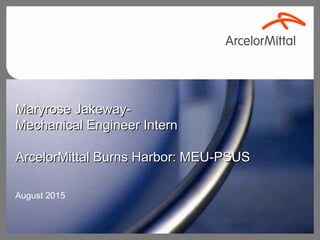2015 Intern Presentation Jakeway
- 1. Maryrose Jakeway-Maryrose Jakeway- Mechanical Engineer InternMechanical Engineer Intern ArcelorMittal Burns Harbor: MEU-PSUSArcelorMittal Burns Harbor: MEU-PSUS August 2015
- 2. 08/04/15 Jakeway, Maryrose 2 IntroductionIntroduction Maryrose Jakeway Michigan State University Mechanical Engineering Exp Grad: December 2016 MEU ŌĆō Op Tech Manager: Derek Rinaldo Mentor: Kaethe Pfeiffer
- 3. 08/04/15 Jakeway, Maryrose 3 What I Did This SummerWhat I Did This Summer For Fun ŌĆóReading/Cooking/Painting/Exploring the Area/Binge Watching TV ŌĆóBoat Cruise ŌĆóRailCats Game ŌĆóWhite Sox Game For Work ŌĆóSafety Tours & Training ŌĆóEagle Incident Report ŌĆóPower Station SPRV
- 4. 08/04/15 Jakeway, Maryrose 4 Tours & Training (1-2)Tours & Training (1-2) Safety Tours ŌĆóSewage Pumping Station ŌĆóShops Complex ŌĆó Docks ŌĆó Locomotive Repair ŌĆó Fabrication Shop ŌĆó Machine Shop ŌĆó Crane Repair ŌĆó Central Spares ŌĆó Main Shop & Annex Building ŌĆó Blast Furnace Closed Water Pumping Station ŌĆó Lakewater Pumping Station No. 1
- 5. 08/04/15 Jakeway, Maryrose 5 Tours & Training (2-2)Tours & Training (2-2) Additional Tours ŌĆóPower Station ŌĆóSteel Producing ŌĆóIron Producing ŌĆóSinter Plant ŌĆóHot Mill ŌĆóI/N Tek & I/N Kote ŌĆóResearch & Development Training ŌĆóCPR / First Aid ŌĆóArc Flash
- 6. 08/04/15 Jakeway, Maryrose 6 ProjectsProjects Eagle Incident Report ŌĆóCreated follow-up document for June 6th fire under waste treatment bridge. Power Sta South 900/265 psi Steam Pressure Reducing Valve (PRV) ŌĆóModeled S. PRV steam system. ŌĆóAnalyzed current design to determine nominal operational envelope. ŌĆóCompared ideal conditions to 3/20/15 failure. ŌĆóIn progress: Operational Procedure Report.
- 7. Safety Valves on 265 # pipe Damage resulting from 3/20/15 ŌĆó Learned how to perform an engineering and failure analysis. ŌĆó First learn how and why things work. ŌĆó Then look at a failure. ŌĆó What fails? When? Why? How? ŌĆó Knowing max steam flow rates at different pressures/ temperatures changes the operating envelope of the system and how the equipment will respond. ŌĆó Develop a ŌĆ£modelŌĆØ of the system. South PRV: LearningSouth PRV: Learning LessonsLessons
- 8. 500 600 700 800 900 1000 1200 200 2.725 3.059 3.38 3.693 4.003 4.31 4.917 250 2.151 2.426 2.688 2.943 3.193 3.44 3.929 300 1.767 2.005 2.227 2.442 2.653 2.861 3.27 400 1.258 1.477 1.651 1.817 1.978 2.136 2.446 500 0.993 1.159 1.304 1.441 1.573 1.701 1.95 600 0.795 0.946 1.073 1.19 1.302 1.411 1.621 700 ŌĆ” 0.793 0.908 1.011 1.109 1.204 1.385 800 ŌĆ” 0.678 0.7383 0.877 0.964 1.048 1.209 900 ŌĆ” 0.588 0.686 0.772 0.852 0.928 1.071 1000 ŌĆ” 0.514 0.608 0.688 0.761 0.831 0.962 1100 ŌĆ” 0.453 0.545 0.619 0.687 0.75 0.872 Input Temperature (┬░F) 900 Pressure (PSIA) 900 Sp. Volume (ft 3 /lb) 0.852 Diameter (inches) 20 Min Velocity (ft/s) 100 Max Velocity (ft/s) 300 1250 Output Min Capacity (klb/h) 921.83 Max Capacity (klb/h) 2,765.49 135.6 Pressure(PSIA) Temperature (┬░F) Properties of Superheated Steam Velocity (ft/s) For known capacity and unknown velocity, use alternative input/output. Alternative Input Capacity (klb/h) Alternative Output This model uses the continuity equation to determine capacity at a given temperature, pressure, pipe dimension, and an assumed range of operational velocity. *specific volume is automatically found using steam table









